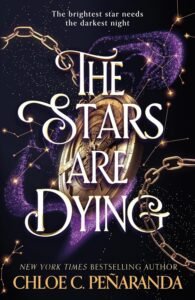The Stars Are Dying (Nytefall Trilogy book 1) by Chloe C. Pen᷉aranda (book review).
There are times when a writer’s enthusiasm for the book they are writing gets in the way of something coherent. They invest their energy in the ideas and forget the basic tenets of world-building. They may be too close to the story, and it needs another eye to point out the inconsistencies.
‘‘The Stars Are Dying’ is the first volume of the fantasy ‘Nytefall Trilogy’. The first-person narrator is Astraea. The world she lives in appears to be a continent broken into several island territories. Looking at the map provided, I sincerely hope that the water dividing all the countries is not rivers, as they do not behave in a normal geographical manner. Instead, the continent appears cracked, and the land areas ought to be drifting apart. At its centre is Vestire, the city that is the capital and seat of kings. Since the setting is a fantasy world with magic, discrepancies in geography can perhaps be ignored. The unusual feature in the landscape is the Celestial Veil, which covers the continent east of Vestire, through which no one can pass.
For five years, Astraea has been a virtual prisoner of Hektor Goldfell. She has no memory of her life before he found her wandering in the woods, and he tells her that she has to keep her presence a secret for her own protection. In the world, there are vampires. Some feed on blood, but others feed on souls. Astraea finds out what is happening in the outside world by eavesdropping, literally, as she hides in the rafters of the main hall of Hektor’s house. He is wealthy, making his money from running a high-class brothel, but from her listening post, she learns of the Libertatem, at which champions from each province would compete for the chance to have their realm free from vampires for a hundred years.
On her way back to her room after one of these sessions, she realises she is about to be discovered roaming the corridors, so she slips into a room she thinks is unoccupied. It isn’t, and she has to think fast and dances for the occupant. He is a soul vampire that calls himself Nyte. She is to encounter him several times throughout the novel as the connection between them strengthens.
In the meantime, Astraea is chafing against the boundaries Hektor imposes on her and desires escape, although he tells her that the medicine he gives her is all that is keeping her alive. He is manipulative in all his transactions, including allowing her only contact outside his home with Cassia, daughter of the reigning Lord of their province, Alisus. Cassia has been selected as the champion and will be heading for Vestire to compete in the Libertatem. Astraea is determined to go with her. She manages to escape Hektor with Nyte’s help. They are pursued, and, on the journey to Vestire, Cassia is killed. This results in Astraea taking her place in the contest.
Although this novel contains intriguing elements, it frustratingly and deliberately conceals many of them. One of these is the backstory for Astraea. We are told that Hektor found her in the woods without memory five years previously. That would have been a good starting point for showing the development of the relationship, presumably from gratefulness to becoming lovers to her realisation that she was being used. There are inconsistencies here, too. It turns out that the ‘medicine’ that Hektor has been feeding Astraea is ‘Starlight Matter’, yet, later in the novel, she uses this same substance to change the colour of her hair and convince the organisers of the Libertatem that she is Cassia and has a right to compete. We are given no clues as to how this magical substance works, why she needs it for her health or what happens when she stops taking it or what its everyday uses are.
Once the contest starts, there are echoes of ‘Hunger Games’ here; the five contestants are tasked with finding the parts of a key. They waste time chatting and relaxing instead of working, especially since they’re trying to kill each other while the other contestants are in the field. There is no sense of urgency, especially when Astraea frees Nyte from captivity and they spend time kissing instead of escaping from pursuit. When a prisoner escapes, one would anticipate a significant uproar.
At times, it is not clear what is real and what isn’t— who is dead and who is still breathing. While it might be clear in the author’s mind, it is confusing the reader.
As a comparatively minor point, at one stage, we are told that books are rare. Is it then rare for ordinary people to be able to read? In our own mediaeval society, it was common for even the aristocracy to be illiterate and proud of it. There is a danger here of putting modern values on a technically less advanced culture.
Overall, I consider Astraea a tiresome character, too self-centred and too ready to go along with what is suggested to her. Perhaps the explanation for Astraea’s character is found in the missing five years. Nyte is portrayed as an evil vampire but is a more intriguing character, as was Cassia before she was murdered. She had purpose.
I am not drawn to following up the next stage in their adventures in subsequent volumes.
Pauline Morgan
August 2025
(pub: Wildfire/Headline, 2024. 411 page hardback. Price: £20.00 (UK). ISBN: 978-1-03-542212-8)
check out website: www.hachette.co.uk/titles/chloe-c-peñaranda/the-stars-are-dying/9781035415281/


